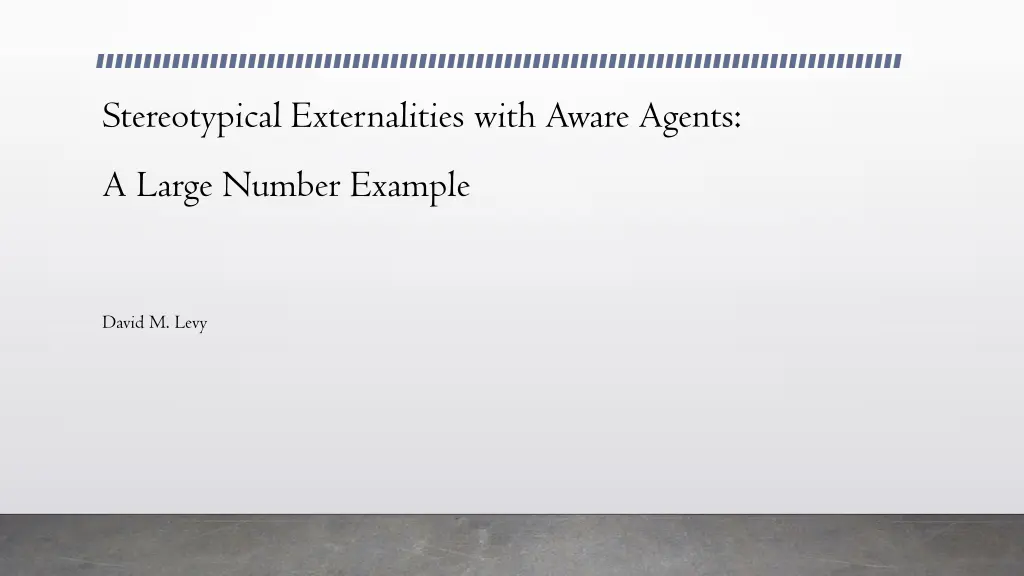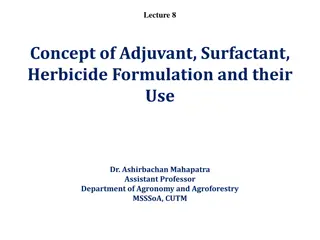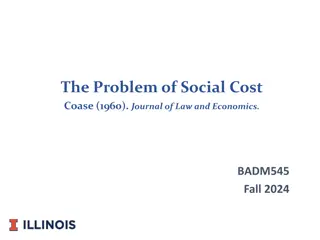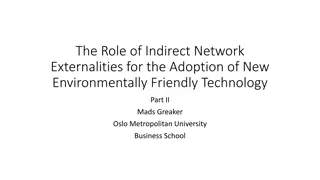
Aware Agents and Stereotypical Externalities: Impacts on Group Dynamics
Explore how aware agents in societal groups influence stereotypical externalities, as discussed by David M. Levy and classical scholars like David Hume and Adam Smith. Discover insights on statistical discrimination and the implications for democratic politics and societal behaviors.
Download Presentation

Please find below an Image/Link to download the presentation.
The content on the website is provided AS IS for your information and personal use only. It may not be sold, licensed, or shared on other websites without obtaining consent from the author. If you encounter any issues during the download, it is possible that the publisher has removed the file from their server.
You are allowed to download the files provided on this website for personal or commercial use, subject to the condition that they are used lawfully. All files are the property of their respective owners.
The content on the website is provided AS IS for your information and personal use only. It may not be sold, licensed, or shared on other websites without obtaining consent from the author.
E N D
Presentation Transcript
Stereotypical Externalities with Aware Agents: A Large Number Example David M. Levy
Statistical Discrimination A stereotype has taken as a sensible estimate of a group characteristics supposing group members unaware of stereotypical externalities. Arrow 1971, Phelps 1972. David Hume and Adam Smith point out how small religious groups police their members behavior in evident awareness of stereotypical externalities. The words Hume uses are dishonor on the whole; Smith uses for the credit of the sect (Levy and Peart 2016). Is the Hume-Smith solution is available in a large number setting via democratic politics? Why would African-American legislators vote to impose a harsher penalty on a drug favored by African-Americans than on the chemically equivalent drug favored by others?
Hume Text We start with David Hume s enormously complicated essay Of national characters. In the 1753 1754 edition of Essays Hume added this note: A small sect or society amidst a greater are commonly most regular in their morals; because they are more remarked, and the faults of individuals draw dishonour on the whole. The only exception to this rule is, when the superstition and prejudices of the large society are so strong as to throw an infamy on the smaller society, independent of their morals. For in that case, having no character either to save or gain, they become careless of their behaviour, except among themselves. Hume ([1777] 1987, p. 205). The 1753 1754 ought to be of considerably scholarly interest because as Hiroshi Mizuta (2000, p. 126) documented, there is a 1752 letter from Hume to Smith asking whether he had any suggestions for addition or subtraction for the new edition of Essays.
Smith Text A man of low condition, on the contrary, is far from being a distinguished member of any great society. While he remains in a country village his conduct may be attended to, and he may be obliged to attend to it himself. In this situation, and in this situation only, he may have what is called a character to lose. But as soon as he comes into a great city, he is sunk in obscurity and darkness. His conduct is observed and attended to by nobody, and he is therefore very likely to neglect it himself, and to abandon himself to every sort of low profligacy and vice. He never emerges so effectually from this obscurity, his conduct never excites so much the attention of any respectable society, as by his becoming the member of a small religious sect. He from that moment acquires a degree of consideration which he never had before. All his brother sectaries are, for the credit of the sect, interested to observe his conduct, and if he gives occasion to any scandal, if he deviates very much from those austere morals which they almost always require of one another, to punish him by what is always a very severe punishment, even where no civil effects attend it. (WN V.i.g.12; pp. 795 96)
Literature Teview Four JSTOR hits No links to Hume No links to statistical discrimination in the three possible cases We re on our own
Why Sentence Differences for Crack and Cocaine? Racism pure and simple Sklansky 1995. African American Legislators voted for the differences Kendall (1997, pp. 370 380). The public support in the African-American community for the war on crack is documented by Brian Mann (2013). This suggest that there is more than racism
Is There Evidence of Worry about Stereotypes? The procedure followed to look for sensitivity to stereotypes is to examine the searchable Amsterdam News, the New York newspaper with a large Afro-American readership. Search terms are crack babies, racism and stereotype with some variation
Reversing Causality Arrow Phelps go from behavior to stereotype Newspaper discussion points to TV as information aggregator Stereotypes are not an estimate from random draws supposed by Arrow Phelps Newspaper discussion points to reverse causality Drug use is illegal Police acting on stereotype think these people are druggies Don t enforce the law because that is what these people do Drug use rises because the cost is lower
Stereotype Traces Bulls-eye on My Sons Bright Future This is a world in which white men are going to the moon, and Black men are going to jail. The message is that racism is justifiable because wouldn't you know it after all that civil rights, black-pride hullabaloo of the '60s those darkies turned out to be shiftless and no account after all. . Yes, my son wears a box haircut and sometimes walks through white neighborhoods late at night to get home from the library. That I don t mind. It's that big bulls-eye traced over his bright future that I m trying to scrub off. (May 12, 1990, p. 6)
Awareness of Stereotype Externalities Ordinary people are perfect aware of how behavior feeds stereotype They can even point to reverse causality Hume and Smith wrote before democratic politics Democratic politics offer a large number extension of Hume-Smith insights Larger point is the classics were better at groups than their heirs






















